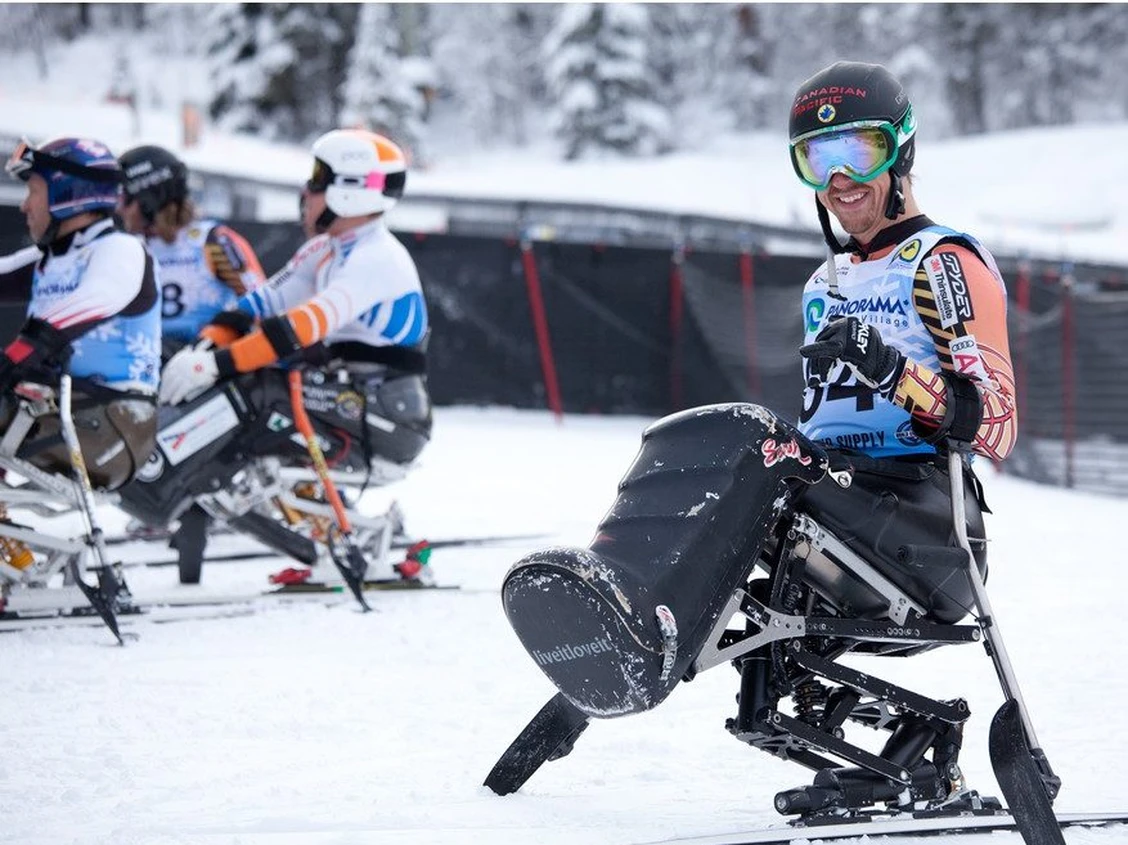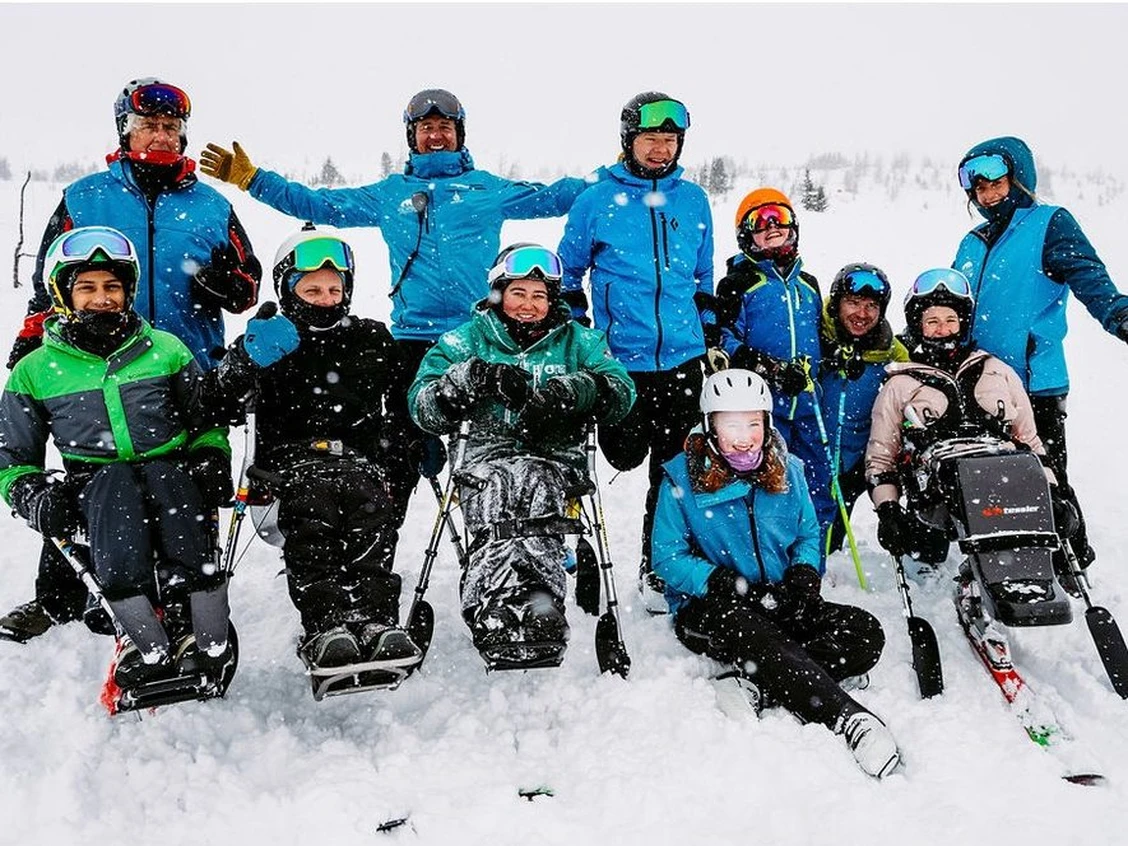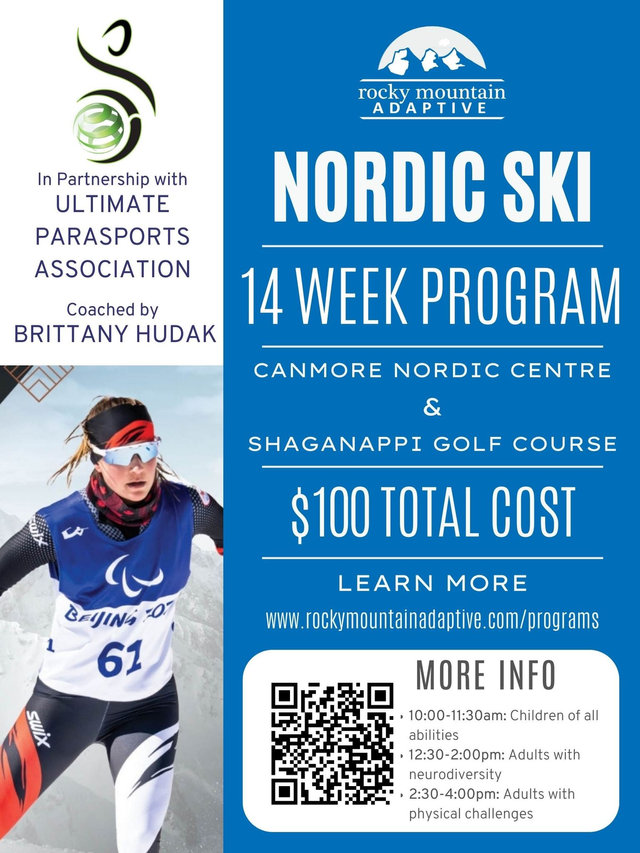
Josh Dueck on his sit-ski in Panorama. Courtesy, Andrew Penner
And there are a number of non-profit organizations that exist to help people with disabilities do just that. Based in Canmore, Rocky Mountain Adaptive is one such charity. Since 2009 they have been a leader in breaking down barriers and helping disabled people recreate. They have helped hundreds of people – in over 20 different sports and recreational activities – experience the joy and countless benefits of participating and experiencing, often, life-changing moments on the ski slopes and in the great outdoors.
“By working with each person’s unique abilities and strengths, by providing specialized adaptive equipment (such as a sit-ski, which is basically a bucket seat that sits overtop of a mono-ski), professional instructors, and trained volunteer support, we remove the barriers to participation,” says Janine Giles, the outreach co-ordinator at Rocky Mountain Adapative. “The RMA dream is to reach as far and wide as possible, making sure that experiences of freedom and empowerment in the mountains are available to as many people as possible.”
While Rocky Mountain Adaptive’s winter programming primarily includes alpine skiing, they also offer cross-country skiing, snowshoeing, ice skating, curling, gymnastics and climbing. The majority of their alpine lessons and programs are based at Sunshine Village, however, they also offer programs at Mount Norquay, Lake Louise and Nakiska.
Although they work primarily with children and youth, people of all ages and abilities – including people with cognitive and social barriers – are welcome to participate. Amputees, people with visual impairments, autism, Down syndrome, brain injuries, you name it, it doesn’t matter. If there is a will, there is a way.

Rocky Mountain Adaptive skiing. Courtesy, Viktoria North
“Each person’s healing journey and recovery is unique,” says Giles. “We have seen that outdoor adaptive experiences increase people’s confidence, strength, independence, and feelings of acceptance. The sense of belonging to a supportive community can be life-changing. And the sense of accomplishment, the perseverance, the laughter, the smiles, it’s amazing to see this and to be a part of it. The positive stories are what drive us.”
Not surprisingly, given the fact that adaptive sports (and, of course, the specialized equipment, highly skilled instructors, and host of volunteers that make it all possible) have come a long way in a short period, Rocky Mountain Adaptive strives to make the entry as easy as possible for participants. One of the ways they do this is through their highly successful “Try Me” events. Interested participants can simply show up and try a variety of adaptive sports with no cost or commitment. In winter, sports such as sit-skiing, stand-up skiing, snowboarding, and cross-country skiing are offered in these events.
In summer, adaptive hiking (all-terrain wheelchairs are a thing!), mountain biking (with three-wheeled adaptive mountain bikes), and a variety of paddle sports are featured. You can check out www.rockymountainadaptive.com to find out more.
“From there, if people are interested, they can sign up for additional drop-in and multi-week programs,” says Giles. “There is always something happening. Also, our certified coaches make safety a priority. And we want people to be as independent as they want to be. It’s a student-centred approach. We’re all about being creative and creating positive memories for participants.”

Rocky Mountain Adaptive skiing. Courtesy, Viktoria North
Many other organizations and charities also exist to help disabled people recreate and enjoy the mountains. CADS Calgary (Canadian Adaptive Snowsports), CADS Alberta, Calgary Adaptive Hub, and Fernie Adaptive Snowsports are just a few examples. And, in broader terms, organizations like the Rick Hansen Foundation have made it their mission to ensure people with disabilities can live healthy, barrier-free lives in their communities. That work is far from over.
Given the fact that roughly one in five Canadians identify as having some sort of disability, it’s critical that these types of organizations exist. And they all have immediate ways that you through your donations, fundraising, and volunteer support can get involved.
Because, as Josh Dueck will tell you, “Passion plus perseverance equals possibility.”
| Andrew Penner is a photojournalist based in Calgary. You can follow him on Instagram @andrewpennerphotography |
 Source Calgary Herald
Source Calgary Herald


